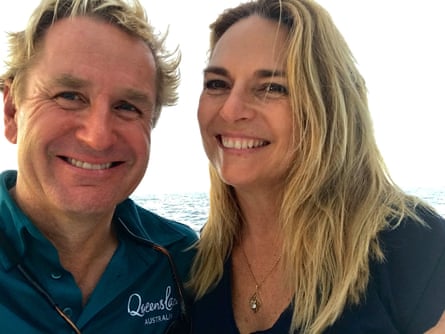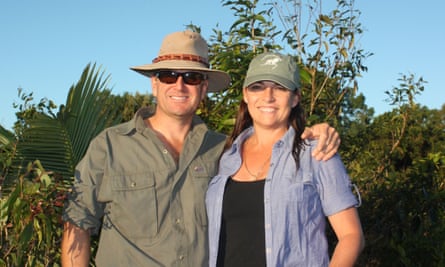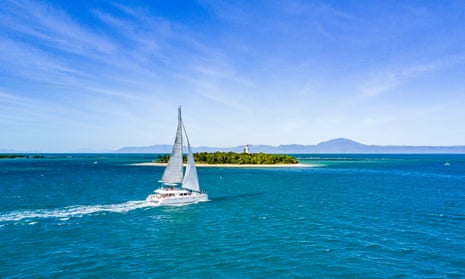Last Tuesday Steve Edmondson held a staff meeting on a sailing boat. The team went to the outer Great Barrier Reef and snorkelled together among the turtles.
It was a bonding exercise after Sailaway Port Douglas shut on 23 March. It was also a learning exercise about the new era of tourism, to give staff a sense of what customers would experience in a “living with Covid” world.
Everyone was asked whether they were feeling well. Each had their temperature checked and their name recorded. The snorkels and masks were double-sanitised, and people picked up their own masks and kept them for the day. Then they had a wonderful time in one of the most beautiful places in Australia.
“We’re reinventing ourselves in terms of the challenge of how to do it differently and in a very thoughtful, sensitive way to get the wheels moving again,” Edmondson says.
The coronavirus restrictions, with bans on large gatherings and international travel halted, have crippled tourism. The industry is “on its knees”, according to federal minister Simon Birmingham. Queensland is the most tourism-dependant state, with one in five jobs in tropical north Queensland tourism-related.

Edmondson, 55, has run Sailaway with his wife Katrina for 17 years. He has become a story himself after penning two letters to the premier, Annastacia Palaszczuk, pleading with her to keep to her original timeline in the state’s coronavirus “roadmap”.
That anticipated opening state borders on 10 July, but Palaszczuk has said it could be September or later. That delay, wrote Edmondson, would “inadvertently strangle our tourism industry and far north Queensland with a slow painful death of our economy and employment”.
Edmondson says everything went “nuts” after his letters. He did 12 media interviews in 10 days, with everyone from Alan Jones to The Project.
“I’m not a professional protester,” he says. “It takes a lot for me to rev up and write to politicians.”
Edmondson is not a “let it rip” man, and he is not one of those who claim the response to Covid-19 has been excessive. Coronavirus is “a big, big deal” and he had no problem shutting in March.
But he argues the continued uncertainty for Queensland tourism operators – especially the closed borders with southern states – has not been fully explained, particularly as it contradicts federal health advice, which was never to close state borders. The Queensland government has indicated it wants no community transmission of the virus in New South Wales and Victoria before reopening.
Edmondson characterises the weeks of closure as a “great realisation”.
“It’s given us time to reflect, do we need that? How can we do it differently? What are those core values, to really stop the fast pace [of life]? It’s given everybody a sense of vulnerability.”
Tourism can reinvent itself. “We have to live with Covid and keep it under control and have these practices in place and get on with life,” he says.
“So, authenticity, small, personal, connecting with your family and friends is more important than ever.”
What’s happened to Sailaway is a glimpse into an industry in freefall. Between 50% and 60% of customers who book everything from a sunset sail to an all-day trip to the reef are from overseas, especially the US, Europe and Scandinavia. International tourism is all but dead, at least for 2020.
Edmondson says when everything shut down, he borrowed $250,000 to refund forward bookings. He has a $200,000 insurance and rent bill due next year. All up, he estimates he has lost $1.5m.
Last week, he made a “heartbreaking” decision. The business has four sleek, beautiful catamarans. He’s put one of them, a lagoon 500 catamaran worth around $1.2m, up for sale. “We’re saying rather than boxing ourselves in a corner and saying ‘Oh, my God, hands up, I give in. I’ve given up. Here’s my administration’, we’re like, this is what we need to do to survive.”

Sailaway is in a better position than some other tourism businesses. It already runs small tours, four to six people on a sunset sail and up to 33 for a day trip to the Great Barrier Reef, snorkelling with turtles and learning about the reef from a marine biologist. Eleven of his staff are on jobkeeper and have been trained in how to minimise the risk of coronavirus.
He believes domestic tourism can fill the gap left by absent international travellers but not until the state borders are open. Interstate visitors make up almost half of Queensland’s domestic tourism market.
The Queensland government initially announced that restrictions on travel within Queensland would lift on 12 June. But it brought that forward to 1 June. The premier says she won’t budge on interstate borders until another review at the end of the month.
Edmondson watched the announcement with a mixture of relief and frustration. Yes, it was good that at least Queenslanders could visit, but the abrupt nature of the decision meant that few businesses were ready, and flights were not up and going.
There are looming dates that could mean the difference between businesses surviving or not, he says. School term two ends on 26 June in Queensland and Victoria, with NSW beginning school holidays in early July. People need time to plan and book holidays, and bars, restaurants, cafes and tourism operators need time to reopen safely. Without more certainty, the critical school holiday period, when southerners escape wintry weather for Queensland, could be lost.
“It’s a great start and we welcome it [the reopening of Queensland travel for Queenslanders]. However, it’s important not to forget that [the government] intended to open borders in July. We really need to have reassurance that the road map would be followed. We can’t have guessing games all the way through.”
Edmondson was preparing to resume sailing tours for locals on 13 June. Now that the dates have been brought forward, he’s scrambling to respond. He has decided to offer more private charters for people who feel vulnerable about Covid-19. On Wednesday, the boat and crew will be ready for a family of eight who want to visit the reef. It’s a start.

Edmondson is an optimist. He insists that tourism is not taken seriously enough as an industry, and if it was, could be a key part of Australia’s economic recovery. He is frustrated with the continuing romance with fossil fuels such as coal, “when the rest of the world is actually moving ahead more than we are”. We need jobs, but “the right jobs for the right future”.
Some of those jobs could be in sustainable tourism, in businesses like his. Sailaway will continue, he insists, even if it carries more debt.
“We’re going to survive, whatever it takes,” he says. “We’ve had a whole lifetime of this, and we love what we do.”
Postcards from the pandemic looks at how everyday Australians are coping with immense changes coronavirus has brought to their lives. We’d like to hear your story about how you are managing during this crisis. Email: postcards@theguardian.com
